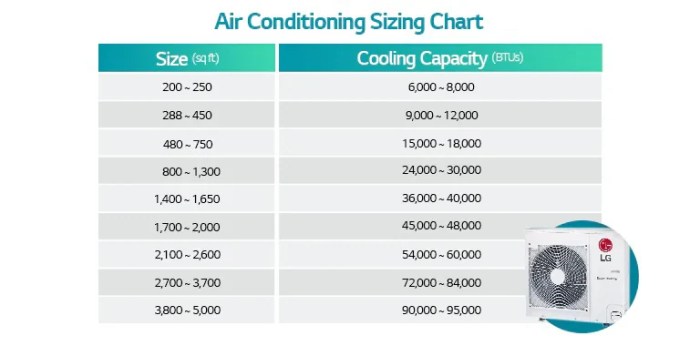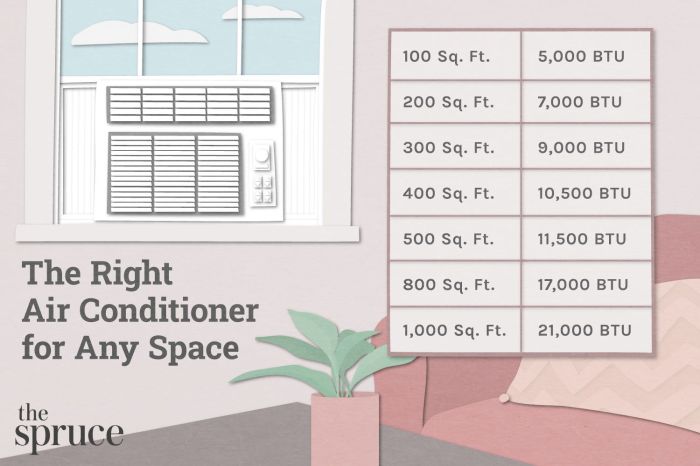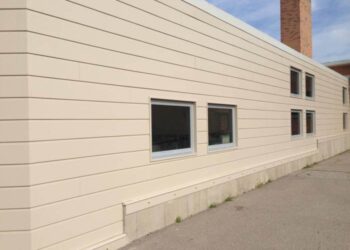Embark on a journey to understand the significance of choosing the correct BTU rating for your air conditioner. This guide will unravel the complexities and provide clarity on this essential aspect of cooling your living space.
Delve into the nuances of BTU ratings and how they impact the efficiency of your air conditioner.
Understanding BTU Rating

BTU (British Thermal Unit) rating is a measurement used to determine the cooling capacity of an air conditioner. It indicates how much heat an air conditioner can remove from a room in one hour.
How BTU Rating Affects Cooling Capacity
The higher the BTU rating, the more powerful the air conditioner is and the larger the area it can effectively cool. On the other hand, an air conditioner with a lower BTU rating may struggle to cool a larger room efficiently.
- 6,000 - 10,000 BTU: Ideal for cooling small rooms or spaces up to 300 square feet.
- 10,000 - 14,000 BTU: Suitable for medium-sized rooms between 350-500 square feet.
- 14,000+ BTU: Best for large rooms or spaces above 500 square feet.
Factors to Consider
When choosing the right BTU rating for your air conditioner, there are several factors to take into consideration to ensure optimal performance and energy efficiency. These factors can directly impact the effectiveness of your cooling system and ultimately your comfort level.
Room Size
The size of the room you need to cool is a crucial factor in determining the appropriate BTU rating for your air conditioner. A larger room will require a higher BTU rating to effectively cool the space, while a smaller room may be adequately cooled with a lower BTU rating.
It's important to measure the square footage of the room accurately to avoid under or over-sizing your air conditioner.
Insulation
The level of insulation in your home plays a significant role in the efficiency of your air conditioner. Well-insulated homes retain cool air better, allowing the air conditioner to work more effectively. If your home is poorly insulated, you may need a higher BTU rating to compensate for the heat gain and loss through walls, windows, and doors.
Climate
The climate of your region can also impact the choice of BTU rating for your air conditioner. Hotter climates will require a higher BTU rating to combat the extreme temperatures, while cooler climates may only need a lower BTU rating for occasional use.
It's essential to consider the average temperature and humidity levels in your area when selecting the right BTU rating for your air conditioner.
Tips for Determining the Appropriate BTU Rating
One common rule of thumb is to calculate the BTU requirement by multiplying the square footage of the room by 20. However, this method may not be accurate for all situations.
- Consult a professional: If you're unsure about the right BTU rating for your air conditioner, it's best to seek advice from a professional HVAC technician who can assess your specific needs.
- Consider additional factors: In addition to room size, insulation, and climate, other factors such as ceiling height, number of windows, and sun exposure can also influence the BTU rating needed.
- Opt for energy efficiency: Choosing an air conditioner with a higher EER (Energy Efficiency Ratio) can help you save on energy costs in the long run, even if it has a slightly lower BTU rating.
- Balance cooling power: It's important to find a balance between getting a unit with sufficient cooling power and avoiding unnecessary energy consumption by oversizing the air conditioner.
Room Size and BTU Rating

When it comes to choosing the right BTU rating for your air conditioner, considering the size of the room is crucial. The BTU rating needs to match the room size to ensure optimal cooling efficiency and comfort.
Calculating the Ideal BTU Rating
To calculate the ideal BTU rating for your room, you can use a simple formula:
BTU = (Length x Width) x 25
This formula takes into account the dimensions of the room in square feet. By multiplying the length and width of the room and then multiplying the result by 25, you can determine the approximate BTU rating needed for the space.
Consequences of Incorrect BTU Rating
Choosing a BTU rating that is too high for a small room can lead to the air conditioner cycling on and off frequently, resulting in energy inefficiency and uneven cooling. On the other hand, selecting a BTU rating that is too low for a large room will make the air conditioner work harder than necessary, leading to increased energy consumption and reduced cooling effectiveness.
It is important to match the BTU rating to the room size to ensure optimal performance and energy efficiency.
Energy Efficiency Considerations
When it comes to choosing the right BTU rating for your air conditioner, energy efficiency is a crucial factor to consider. The BTU rating directly impacts the energy consumption of the unit, which in turn affects your electricity bills and environmental impact.
Impact of BTU Rating on Energy Efficiency
The higher the BTU rating of an air conditioner, the more energy it will consume to cool the space. This means that a higher BTU unit may result in higher electricity bills and increased energy usage. On the other hand, an air conditioner with a lower BTU rating may not provide sufficient cooling for larger rooms, leading to overworking the unit and potentially higher energy consumption in the long run.
Balancing Cooling Needs with Energy-Saving Considerations
One way to balance cooling needs with energy-saving considerations is to accurately determine the size of the room that needs to be cooled. By matching the room size with the appropriate BTU rating, you can ensure that the air conditioner operates efficiently without consuming excess energy.
Additionally, investing in an air conditioner with energy-saving features such as programmable thermostats, energy-efficient compressors, and proper insulation can further help in reducing energy consumption while maintaining a comfortable indoor temperature.
Final Thoughts

In conclusion, selecting the appropriate BTU rating for your air conditioner is crucial for optimal cooling performance. Make informed decisions based on the factors discussed and enjoy a comfortable environment in your home or office.
Top FAQs
How does insulation affect the choice of BTU rating?
Insulation plays a significant role in determining the BTU rating needed as poor insulation may require a higher rating to cool effectively.
Can a BTU rating that is too high be detrimental?
Yes, an excessively high BTU rating can lead to inefficiency and higher energy consumption.
What are the consequences of choosing a BTU rating that is too low?
A low BTU rating for a large room will result in inadequate cooling and strain the air conditioner, leading to increased wear and tear.












